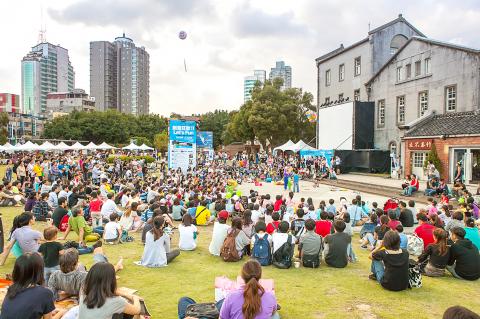This weekend, the popular Huashan 1914 Creative Park will host an event celebrating Taipei’s young creatives. The “Weave My Dream” (築夢市集) event caters to millennial and Generation Z artists.
The venue, an old wine factory now converted into a bustling hipster marketplace, is the perfect backdrop for such an event. “Weave My Dream” will serve as a microcosm of the distinct culture and aesthetic that has emerged among Taipei’s young people, exhibiting a fusion between Taiwanese and Western creative styles.
One section of the market will consist of creative exhibitions and performances. From JUTEBAG (潮麻包), a traditional Taiwanese bag creator, to Crafttopia Taipei (六悅佳居), an innovative pottery store, diverse artistic disciplines will showcase or sell their work around the venue.

Photo courtesy of the Taiwan Tourism Bureau
Another area will contain products marketed toward youth wellness, including the popular millennial lifestyle store Little Yellow Studio (小黃間). The section will also include food stalls, a staple of the Huashan Creative Park experience.
■ Huashan 1914 Creative Park (華山1914文化創意產業園區), 1, Bade Road, Sec 1, Taipei City (台北市八德路一段1號)
■ Tomorrow and Sunday from 11am to 7pm. Admission is free

The canonical shot of an East Asian city is a night skyline studded with towering apartment and office buildings, bright with neon and plastic signage, a landscape of energy and modernity. Another classic image is the same city seen from above, in which identical apartment towers march across the city, spilling out over nearby geography, like stylized soldiers colonizing new territory in a board game. Densely populated dynamic conurbations of money, technological innovation and convenience, it is hard to see the cities of East Asia as what they truly are: necropolises. Why is this? The East Asian development model, with

June 16 to June 22 The following flyer appeared on the streets of Hsinchu on June 12, 1895: “Taipei has already fallen to the Japanese barbarians, who have brought great misery to our land and people. We heard that the Japanese occupiers will tax our gardens, our houses, our bodies, and even our chickens, dogs, cows and pigs. They wear their hair wild, carve their teeth, tattoo their foreheads, wear strange clothes and speak a strange language. How can we be ruled by such people?” Posted by civilian militia leader Wu Tang-hsing (吳湯興), it was a call to arms to retake

This is a deeply unsettling period in Taiwan. Uncertainties are everywhere while everyone waits for a small army of other shoes to drop on nearly every front. During challenging times, interesting political changes can happen, yet all three major political parties are beset with scandals, strife and self-inflicted wounds. As the ruling party, the Democratic Progressive Party (DPP) is held accountable for not only the challenges to the party, but also the nation. Taiwan is geopolitically and economically under threat. Domestically, the administration is under siege by the opposition-controlled legislature and growing discontent with what opponents characterize as arrogant, autocratic

When Lisa, 20, laces into her ultra-high heels for her shift at a strip club in Ukraine’s Kharkiv, she knows that aside from dancing, she will have to comfort traumatized soldiers. Since Russia’s 2022 invasion, exhausted troops are the main clientele of the Flash Dancers club in the center of the northeastern city, just 20 kilometers from Russian forces. For some customers, it provides an “escape” from the war, said Valerya Zavatska — a 25-year-old law graduate who runs the club with her mother, an ex-dancer. But many are not there just for the show. They “want to talk about what hurts,” she